Part 14: Crusader Kings: Chapter 14 - A Greek Hohenzollern: 1170 - 1180
1170-1180: A Greek Hohenzollern
Nine-year old Barbara takes her father's assassination badly. She becomes jaded and distrustful, constantly seeing plots and schemes where there are none.

In February of 1170, the orchestrator of Aingeru's death passes away in her sleep at the ripe age of sixty-one.

She leaves behind several claims that belonged to her defunct Northern German dynasty, and these now pass into the hands of Konstantinos.
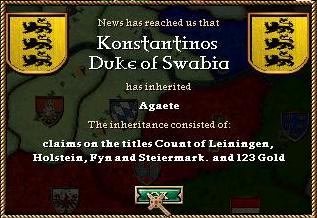
Ill news arrive from Iberia. The Irish crusaders have been driven out, and everything south of Navarra save for a tiny strip of land from Burgos to the northern coast is now in muslim hands. The dream of the reconquista appears dead.
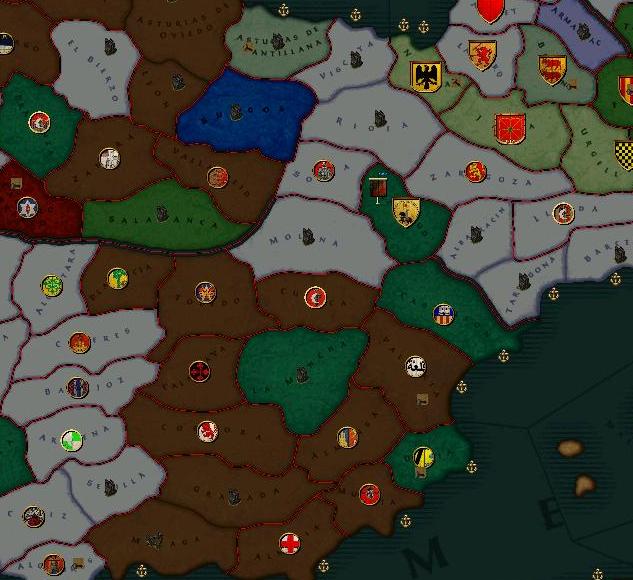
Konstaninos mother Helene, who became increasingly marginalized and isolated in his last years, is found dead in her bed one cold winter morning in november.
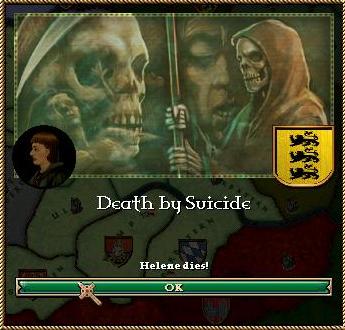
In 1172 the Count of Baden rises against Konstaninos, attempting to get the other Swabian vassals in on his side and start a civil war.
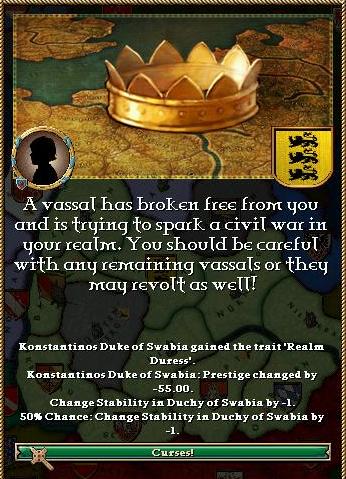
He fails to win any sympathizers for his revolt, and his small army is utterly crushed by Konstantinos' forces. Baden is returned to the demesne.


This swift and decisive action seems to discourage any further revolts, and a couple of months later any malcontents among the nobility have returned to their place in the line.

In 1173 a particularily bright shooting star is seen above Baden. The peasantry grumble and proclaim this to be an ill omen, foreboding more war and disaster in the future. Konstantinos turns to his clerical teachers, who explain that the omen is, in fact a good sign: God is blessing the return of Baden to direct Hohenzollern rule.
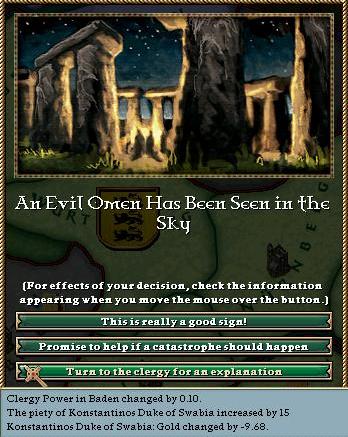
News arrive from Ireland. The green island has dissolved into war, as Scots, Englishmen and the Moors that defeated the Irish crusaders are fighting over its soil. The Irish king now controls less than half of Ireland, and the future of his kingdom looks bleak.

Konstantinos, meanwhile, has been showing far more interest in the matters of booklearning and good christian works than warfare, crusades or even court intrigue. He has turned out to be a soft-spoken and kind boy, who interacts just as easily and naturally with the clergy as he does with the court.

His steward is a harsher soul, and manages to spark a revolt in the rich province of Ulm by squeezing the inhabitants for their last chicken.

In 1175, the political situation in Germany is once again beginning to heat up. Two contenders have emerged claiming themselves as rightful rulers to all Germany - the King of Burgundy-Italy, and the elected successor to the German crown.
Burgundy-Italy controls a patchwork realm consisting of parts of France, South Germany and Italy.
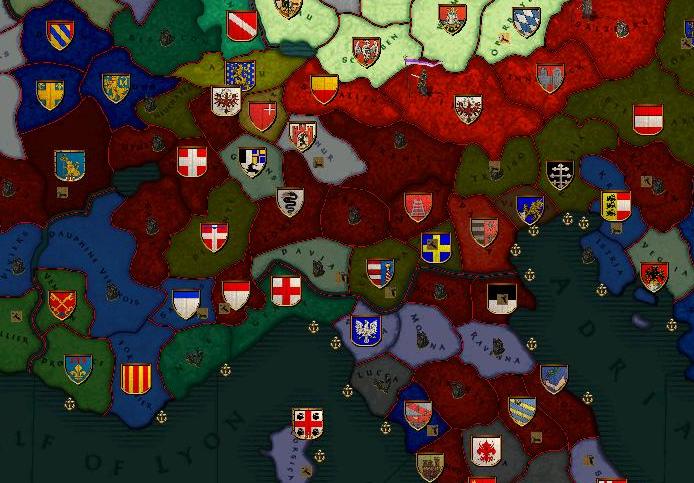
The elected German King has most of North Germany and Austria, as well as a few scattered vassals in Burguny.
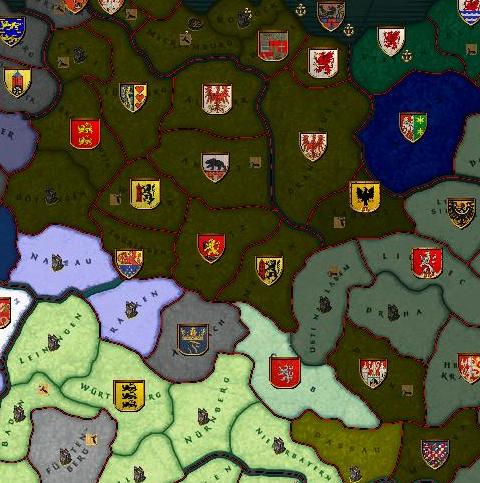
The Burgundian claimant Almerich is the former Duke of Dauphine, who deposed the Zähringens from the throne and has managed to build support by playing on Italian resentment towards the North Germans and the expansionistic Papacy, even going so far as to demand reforms of the church and for a sharp limit to be placed on the power of the Curia. The Pope, in turn, has excommunicated him from the Catholic faith.

The elected king Walram lacks a strong power base of his own, and is forced to rely on diplomacy and concessions to keep the dukes under his rulership from breaking away again. He is, however, an honorable man who sincerely believes that all Germans must stand united, and has been cautiously approaching Swabia for several years in the hopes of gaining control of its large army for that end.
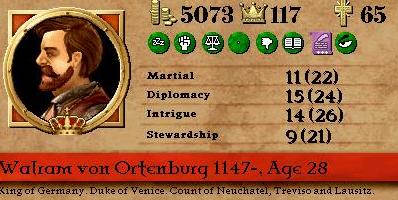
The Count of Niederbayern approaches Konstantinos in August of 1176, complaining that Swabia is hopelessly behind in times compared to the rest of Germany. While most German duchies are ruled according to the principles of a feudal contract that grants essentially all of the power to the nobility who rule in a top-down fashion and set the laws for their own land, Swabia still maintains its ancient traditions of local folk rule and common courts. The count skillfully plays on Konstantinos' trusting and romantic nature by explaining how the local lords are inhibited in doing their duty to the people and God by the meddling of superstitious and backwards peasants. After some deliberation, Konstatinos agrees to institute feudal contract.

Disasterous news arrive in Germany in April the following year. Bereft of support from the German crown for too long, the Teutonic Order have suffered a devastating defeat at the hands of the King of Finland, and have lost all their lands save the island of Ösel.
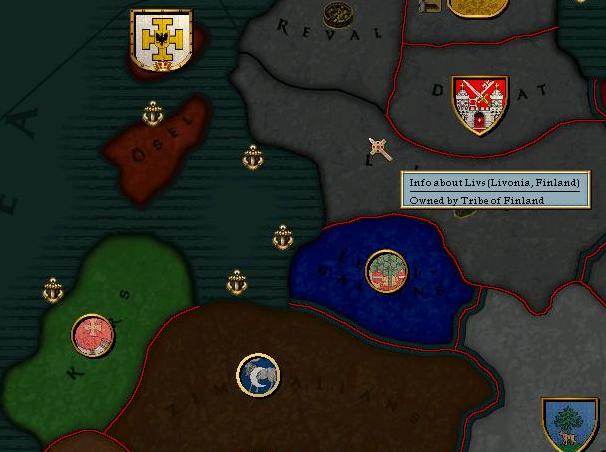
Barbara reaches maritable age. Though her education was to be a diplomat, her suspicious nature has turned her into a conspirer who is far more suited for the role of spymaster. She is wed to Swabia's young Marshal.
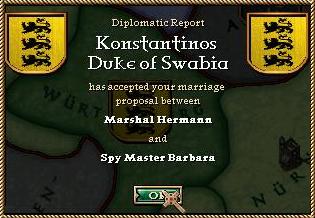
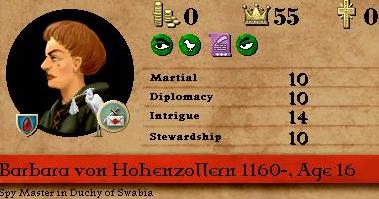
The following year, Konstantinos reaches majority. He has turned out to be knowledgeable scholar, with a sharp mind for both theological and mundane matters. Honest, generous, amiable and trustworthy, he is a brilliant diplomat who excels at making his subjects feel at ease with his rule. The Swabian court has never known to be so content as under his rule.
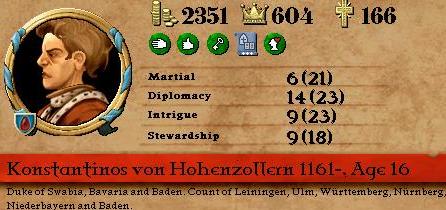
Konstantinos may bear the name of Byzantine Emperors, but he understands his responsibility to the Hohenzollern dynasty and Germany. Since the loss of Treviso, the Hohenzollern line has grown thin, with too few children reaching adult age and too many rulers dying early from injury, illness or an assassin's blade. Swabia is in serious risk of becoming without an heir, and with that in mind, Konstantinos selects a Bohemian bride who is known more for her family line's fertility than for any great mental talents.
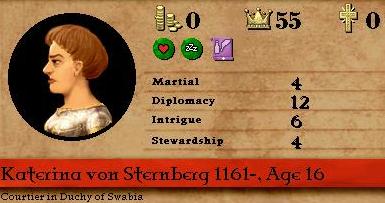
The two are wed, and soon enough...
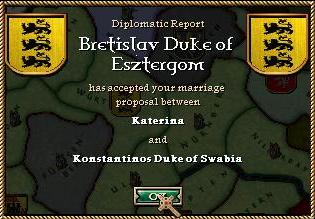
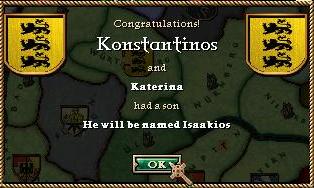
Under the rule of the corrupt King Nikolaus, the nobles and burghers divided the power in Nurnberg between them, turning the peasants into downtrodden serfs. Unrest and sporadic uprisings has been the result, and when the word of Konstatinos' benevolent nature reaches the province, a delegation of village elders travel to Wurrtemberg to present a petition to Nikolaus. Nikolaus manages to arrange a diplomatic solution and placate the peasants without offending the higher classes.
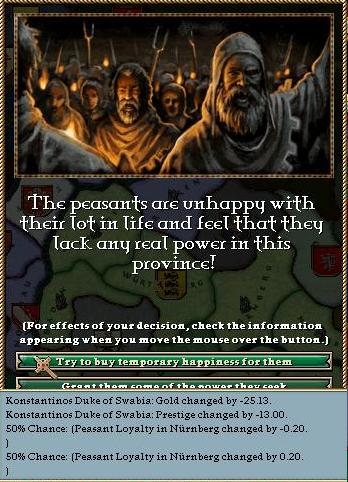
The war for Ireland finally ends in 1180. The Irish kingdom is no more, and the moors have been driven out by England and Scotland, who have divided the island between them.
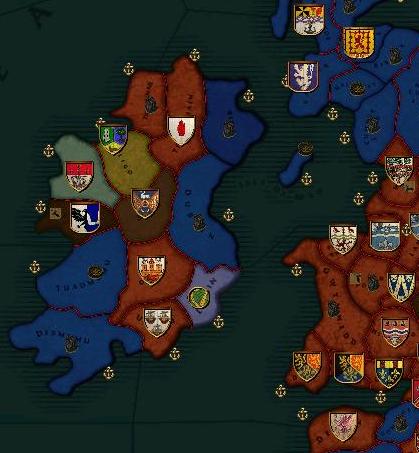
A new ruler also sits on Sweden's throne, and in a few months of rule he has managed to drive the Finns out, subjugate most of his rebellious subjects and take back a province lost to Norway three years earlier.
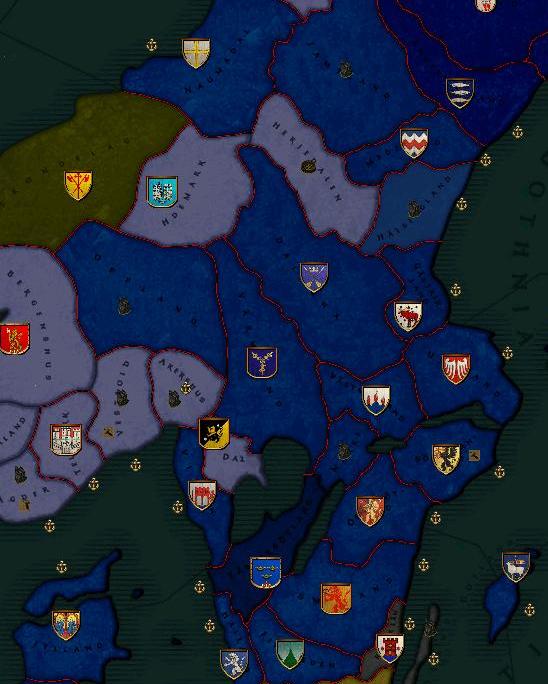
Poland and Polotsk are engaged in yet another of their constant border wars, and as usual, it's going badly for Poland.
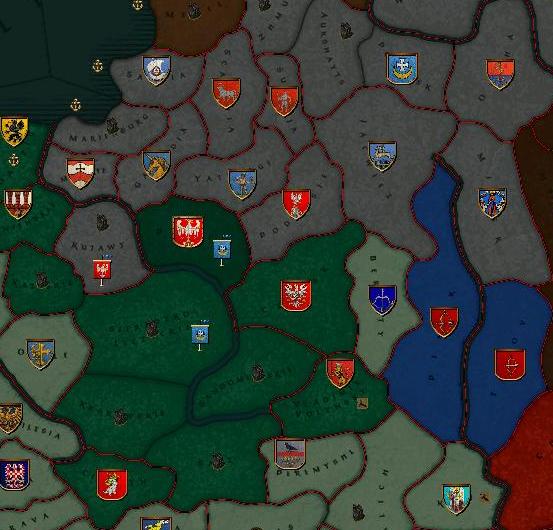
In France, the Grand Duchy of Aquitaine has collapsed, and the whole French realm is in dissolution. If the Moors should have ambitions on it, the only thing standing in their way is the unreliable alliance between Navarra and Toulouse...
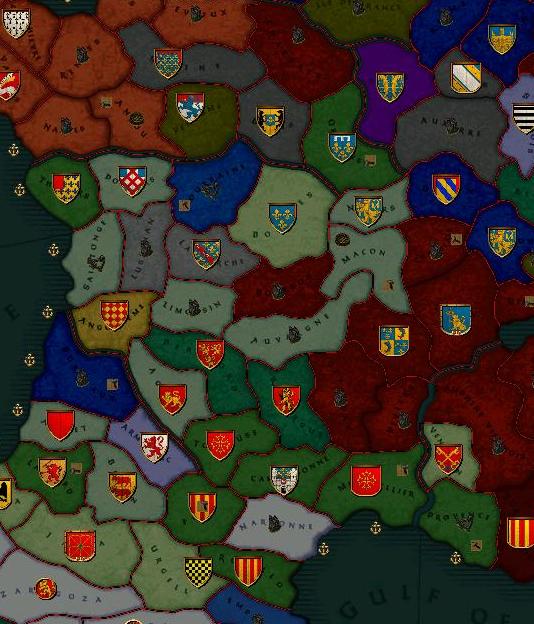
Orthodox and Muslim power is on the rise, while the Catholics are scattered and feuding. The future for the One True Faith seems uncertain.